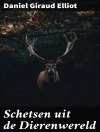In ‘Book about Animals, ‘ Rufus Merrill presents a fascinating exploration of the animal kingdom, intertwining careful observation with philosophical reflections. Through a rich tapestry of vivid imagery and eloquent prose, Merrill engages readers in a dialogue about the nature of animals and their interrelation with human experience. The book’s literary style is marked by a blend of lyrical narration and scientific insight, inviting readers not only to understand animal behaviors but also to reflect on the ethical implications of human-animal relationships. Set against the backdrop of 19th-century America, it engages with contemporary scientific thought while maintaining an accessible narrative that speaks to both intellect and emotion. Rufus Merrill, a prominent figure in American literature and an advocate for animal rights, draws from his extensive travels and interactions with diverse species to inform his writing. His background in natural history and his philosophical inquiries into the role of animals in the human experience shape the book’s compelling arguments for empathy and respect towards the non-human world. Merrill’s commitment to understanding nature is evident in his nuanced prose, making his viewpoints equally pertinent to scientific discussions and literary analyses. This book is a must-read for nature enthusiasts, philosophers, and anyone seeking deeper insights into the connection between humans and animals. With its engaging narrative and intellectual depth, ‘Book about Animals’ provides a unique lens through which to appreciate the wonders of the animal world, making it an essential addition to any library.
เกี่ยวกับผู้แต่ง
Rufus Merrill (1803-1891) was an American author and publisher hailing from Concord, New Hampshire, known primarily for his contributions to children’s literature during the 19th century. Merrill’s publishing career was marked by the production of various series of small, inexpensive books designed to be both educational and accessible. His seminal work, ‘Book about Animals, ‘ reflects his commitment to this cause, offering an engaging and informative glimpse into the animal kingdom for young readers of his time. Merrill’s literary style is characterized by its simplicity and clarity, striving to foster curiosity and a love of learning in children. This didactic approach blends factual content with an uncomplicated narrative style, ensuring that his works could be comprehended by the intended audience with ease. Although not as widely known today as some of his contemporaries, Merrill was a key figure in the democratization of children’s literature, influencing a shift towards materials that were both instructive and enjoyable for the burgeoning audience of young American readers. His contributions have been appreciated for their role in promoting literacy and education during an era when such resources were less accessible to the general population.












